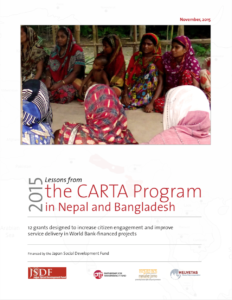
Recent years have witnessed concerns about issues of government effectiveness and accountability, particularly in the delivery of public services. Citizen engagement is increasingly recognized as a method to help improve development program effectiveness. The Partnership for Transparency Fund (PTF) has published Lessons from the CARTA Program in Nepal and Bangladesh to review the unique initiative to enhance World Bank projects by promoting CSO engagement to demand better governance and offer recommendations for future accountability programming.
“Both the demand and supply sides of governance are necessary and complimentary,” explains Frank McNerney, CARTA Program Manager.
From mid-2011 to 2015, the CARTA program supported a total 11 World Bank-financed projects—6 in Nepal and 5 in Bangladesh with 12 sub-projects lasting from one to two years. Each sub-project was a unique pilot for local CSOs to independently carry out awareness raising, monitoring, capacity building and empowerment, testing citizen engagement strategies in a variety of sectors.
Lessons from the CARTA Program offers practical lessons on program design and operation, establishing local partnerships, and project management. It summarizes the primary findings, synthesizes lessons from the varied implementation challenges and outlines the implications for the design of future projects that incorporate citizen engagement in public service delivery monitoring. As social accountability programs are highly dependent on context, the report also describes the results and lessons of each sub-project in detail.
“The change from an essentially top-down governance system at the local level to a democratic process involving traditionally marginalized members of the community is a long developmental process. CARTA faced many challenges initially. There was little understanding of the program and trust levels were quite low among all the parties. Many expected major confrontations, delays, and were not convinced citizens could make a difference,” said Tjaarda Storm van Leeuwen, CARTA Program Director.
To overcome the low levels of trust, the CARTA program used a constructive engagement approach developed by PTF, involving continuous two-way communication and feedback between citizens and government officials, rather than “naming and shaming.” By building the capacity of local CSOs to demand better governance through the basic principles of constructive engagement, the CARTA program was successful in:
- Raising community awareness of project objectives, services and benefits;
- Motivating beneficiaries to demand better service delivery and grievance resolution;
- Increasing the ability of beneficiaries to articulate feedback;
- Improving service provider responsiveness to citizen requests.
The CARTA program experience outlined in this report makes a significant contribution to the evidence base for action-oriented interventions on the demand side of good governance. It clearly demonstrates the value added of citizen engagement, explaining how the activities complimented “internal M&E arrangements in donor or government funded projects and programs by eliciting real-time information from beneficiaries to improve responsiveness and results.” Therefore, the report argues, M&E should be expanded beyond achievement of results to empower beneficiaries so that they are willing and able to demand quality services themselves.

